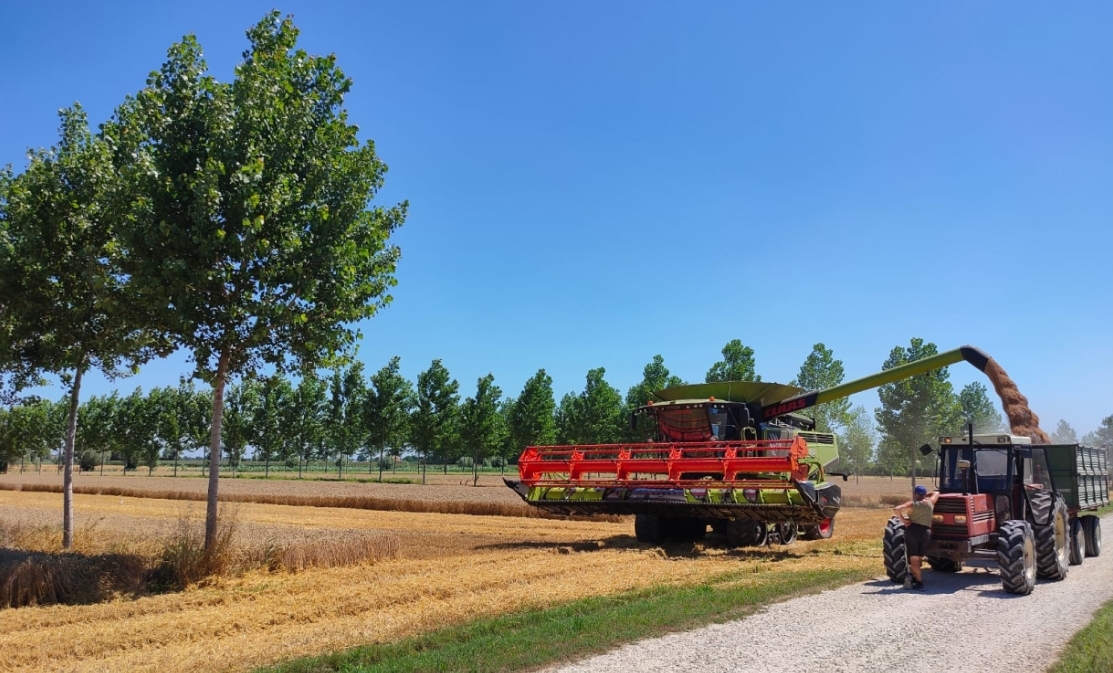
Picture of the Master degree thesis cover of Simone Piotto taken at the “Sasse Rami” pilot farm of Veneto Agricoltura, located in Ceregnano (Rovigo, NE Italy): Mechanical harvest of common wheat in the alley-cropping system with 4 years old poplar trees.
The “Sasse Rami “agroforestry farm of Veneto Agricoltura in NE of Italy: a pilot and demonstrative site for research and dissemination activities on alley-cropping practices with poplar
The “Sasse Rami” farm located in Ceregnano (RO) is the largest pilot and demonstrative farm for agroforestry farming in the North-East of Italy, own by Veneto Agricoltura Agency, the Veneto Region’s Agency for Innovation in the Primary Sector, supporting the Regional Administration in the development of policies concerning farming, agro-food, forestry and fisheries sectors. In February 2018 Veneto Agricultura, in collaboration with the CREA - Forest and Wood Research Centre of Casale Monferrato (AL) and Confagricoltura of Rovigo, started implementing alley-cropping systems with poplars (Populus x canadensis) in the "Sasse Rami" pilot farm. 17 different poplar clones type HES (High Environmental Sustainability), together with the poplar clone I-214 as a control, it being the most used in traditional Italian poplar cultivation, have been planted (i) in a specialized poplar grove with a 6 × 6 m block plantation (⁓290 trees ha-1) and (ii) in an alley-cropping system with NS oriented 38 m apart tree rows placed along drainage ditches (40 trees ha-1). In the alley-cropping system, each tree row hosts the same poplar clones planted in the specialized grove, and the inter-row is cultivated with arable annual crops (common wheat, soybean and sugar beet depending on the year). In February 2022, in order to enlarge the genetic diversity of poplar clones investigated, a second set of 15 different poplar clones type HES (recently registered or under evaluation) have been implemented in another sector of the farm, planted both in a specialized grove with 6 × 6 m design and in an alley-cropping system.
This pilot site hosts several research activities in collaboration with the University of Padova, and the CNR and CREA research centres.
The main objectives of Veneto Agricoltura, together with these research institutions are:
-
To carry out poplar clonal comparison tests, in order (i) to evaluate the productive and qualitative characteristics and the resistance to the main abiotic stresses and the cryptogamic diseases of the new MSA poplar clones, (ii) to assess the suitability of these new MSA clones to the pedo-climatic conditions of NE Italy, and (iii) to identify the most adapted clones to be cultivated in alley-cropping;
-
To investigate different poplar cultivation techniques (i.e., tree pruning and pollarding), in order to identify the optimal tree management to maximize productivity and quality of woody biomass for its subsequent use in the wood processing industry;
-
To assess the impact of tree rows to the microclimatic parameters for the associated crops, and to the environment in terms of biodiversity enhancement, improvement of water and soil quality, and effects at landscape level;
-
To evaluate the effects of tree rows on phenology, physiology and yield and quality of the associated herbaceous crop (Figure 1), in order to define a protocol of cultivation for the different crop species in alley-cropping systems, and to identify the most adapted crop rotation to exploit the positive tree-crop interactions and minimize the competitive ones, in this way maximizing the output of the system.
Beyond hosting several research activities, the “Sasse Rami” farm is a vibrant location regularly hosting visitors, seminars, training and teaching activities for a wide range of end-users (students, farmers, advisor developers, citizens, politicians), with the aim to provide real-scale examples of the best practices to follow for introducing agroforestry practice and implementing high-productive farming systems. There is a solid and increasing network of stakeholder taking advanage of the activities carried out in this farm, and contributing with new ideas to tailor the cultivation techniques and the farmers practices that are being tested here. All the dissemination activities that are running at “Sasse Rami” pilot farm are contributing to foster the adoption on a large scale of these new farming models and on the awareness raising in the entire society.
For more information, please contact: giustino [dot] mezzalira [at] venetoagricoltura [dot] org (giustino.mezzalira at venetoagricoltura.org), anna [dot] panozzo [at] unipd [dot] it (anna.panozzo at unipd.it)











